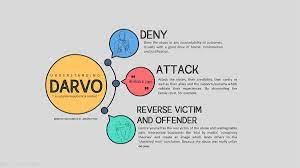What is Darvo? I Experienced it Myself, Get Acquainted
 |
Deny, attack, and reverse victim and offender (DARVO) is a tactic a person may use to deflect responsibility onto an individual they have abused. It is a form of manipulation a person may use to discredit a survivor’s experience.
Someone may use DARVO to make it seem as though the survivor of their abuse was actually the perpetrator.
A person who uses DARVO may deny that they have done anything wrong. They may also state that they are the ones who have experienced abuse rather than the actual survivors. This manipulation may make it difficult for other people to determine who is telling the truth.
Read on to learn more about DARVO, including how it can affect a person’s mental health and how someone may be able to protect themselves against it.
Content Warning. (contents have been medically researched) Adam
This feature mentions experiences of trauma and sexual abuse. Please read at your own discretion.
Was this helpful?
What is DARVO?
DARVO is a technique a person may use to shift responsibility for an abusive incident onto the survivor of the abuse. It may also help the person who perpetrated the abuse deflect some of the responsibility and blame onto the survivor.
A person may use DARVO to avoid punishment or repercussions for their actions.
A study from 2022 looked into the experiences of 89 women who experienced sexual assault while at college. Researchers found that almost half of the participants experienced DARVO tactics from the person who abused them when they had further contact with them.
DARVO comprises three behaviors:
Deny
A perpetrator of abuse may deny that they have done anything wrong. They may minimize the feelings of the person they abused. For example, they may tell the person they have abused that they are:
overly sensitive
blowing things out of proportion
being ridiculous
Attack
When a perpetrator is accused of wrongdoing, they may attack the credibility and character of the survivor of their abuse. They may bring up incidents from a person’s past to discredit their accusations.
A perpetrator may state that the survivor of their abuse:
is a liar
has mental health issues
misuses drugs or alcohol
consented to what happened
has a history of making false accusations
They may also use gaslighting to confuse the survivor of their abuse. Gaslighting is when a person manipulates another person into doubting their own reality. It may cause a survivor of abuse to second-guess what happened.
Reverse victim and offender
A person may state that the survivor of their abuse is actually the one who perpetrated it. Their aim is to discredit the survivor while making it seem as though they are the ones who have been abused.
For example, the perpetrator may lie and state that the survivor of their abuse is:
out to get them
trying to make them look bad or ruin their life
trying to get custody of their children
trying to get money from them
jealous of them
angry that they rejected them
Help is available
If you or someone you know is in immediate danger of domestic violence, call 911 or otherwise seek emergency help. Anyone who needs advice or support can contact the National Domestic Violence Hotline 24/7 via:
phone, at 800-799-7233
live chat, at thehotline.org
text, by texting LOVEIS to 22522
Many other resources are available, including helplines, in-person support, and temporary housing. People can find local resources and others classified by demographics, such as support specifically for People of Color, here:
The Office on Women’s HealthTrusted Source
The National Coalition Against Domestic Violence
Was this helpful?
How can DARVO affect mental health?
DARVO can negatively affect the mental health of a person who has survived abuse. It can be difficult for a person to feel their trauma is being minimized or dismissed. Additionally, feeling like people do not believe them can be harmful.
Research from 2021Trusted Source investigated how female survivors of sexual assault felt if police did not believe them. Researchers found they felt:
a loss of trust in the police
victimized by the police and made to feel at fault for what happened
a loss of self-worth, self-image, self-confidence, or self-esteem
negative effects on their overall health and well-being
A 2017 study found that a perpetrator using DARVO could cause a survivor to feel like they were to blame for an abusive incident. Researchers noted that the more a person was exposed to DARVO, the more likely they were to blame themselves for the abuse they experienced.
DARVO can also affect how other people view the perpetrator and the survivor of their abuse.
A study from 2023 with undergraduate students looked into the effect of DARVO on their perception of perpetrators and survivors of sexual assault. Researchers found that study participants rated perpetrators who used DARVO as:
less abusive
less responsible for the sexual assault
more believable than perpetrators who did not use DARVO
Additionally, participants rated survivors of perpetrators who used DARVO as less believable and more abusive. They were also willing to punish the survivor and less willing to punish the perpetrator.
It is important for people who have survived abuse to understand that they are not to blame for what happened to them. The responsibility lies with the person who abused them.
Comments